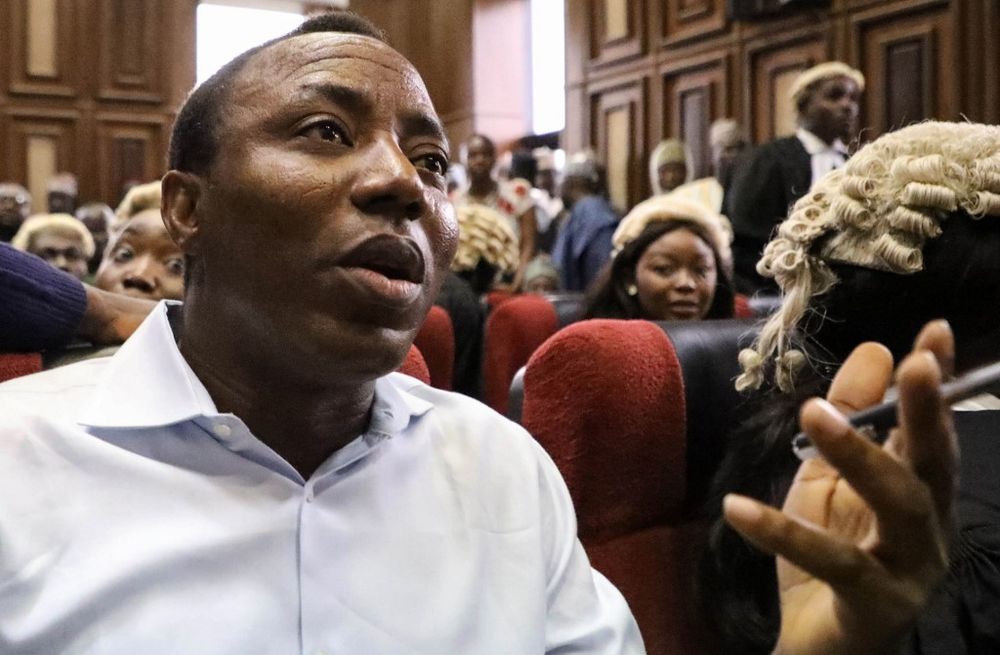LAGOS, Dec 15 — Rights groups and the media have reacted furiously to the re-arrest of journalist and opposition figure Omoyele Sowore by Nigeria’s secret service earlier this month.
Civil society groups and newspaper editorials were scathing when the journalist was re-arrested a day after a court ordered him freed, following months of detention for having called for protests against the president.
These critics place the blame squarely on President Muhammadu Buhari, accusing the former military ruler of an “authoritarian drift” towards “dictatorship”.
The outcry reflects rising fears over the increased detention of journalists and opposition figures since Buhari took office in 2015.
And dramatic smartphone footage of a brawl as what appeared to be government agents tried to seize the journalist during a courtroom hearing have only added to the mounting anxiety.
Agents of the Department for State Services (DSS) initially detained Sowore back in August, after he called for protests against misrule in Nigeria under the online banner “#RevolutionNow”.
He was charged with treason and held pending trial — and although a court ordered his release in September, the DSS kept him locked up.
He was only freed on December 5 — along with co-defendant Olawale Bakare — after a court again ordered his release and levied a symbolic fine against the DSS for having ignored the earlier order.
But Sowore’s freedom was short lived.
Courtroom brawl
A day after being freed, Sowore was back in court for the rest of his trial when armed men, some wearing hoods, forced their way into the high court in the capital Abuja.
As they wrestled him to the ground and tried to drag him away, a crowd of supporters rushed to his defence. In the ensuing chaos, the chief judge had to be evacuated by a side door.
One of Sowore’s lawyers, Femi Falana, told AFP that it had been DSS agents who tried to re-arrest his client. Once they had promised to release him after questioning, he had driven Sowore to the DSS offices himself, he added.
More than a week later, he is still in custody.
In a press release, DSS spokesman Peter Afunanya blamed Sowore’s supporters for the courtroom court chaos.
Sowore had participated in a meeting the day before at the Hilton Hotel in Abuja, where he had promised “to sow anarchy in the country”, Afunanya added.
But nobody had told Sowore why he was being held, his lawyer, Adeyinka Olumide-Fusika, said.
“He looked his ebullient self,” Olumide-Fusika told AFP after visiting his client — even if after almost five months in solitary detention, his health was a concern.
‘Military dictator’
Sowore, 48, is the publisher of the online news site Sahara Reporters.
A vocal critic of Buhari’s government, he was an unsuccessful presidential candidate in February’s elections after running a populist campaign tagged “Take It Back”.
When on August 1 he called for a “Revolution Now” movement of demonstrations, the authorities responded with a fierce clampdown.
When Sowore was first arrested, he was charged not just with treason but with money laundering and cyber-harassment against the head of state.
After the courtroom clash, presidential spokesman Garba Shehu took to Twitter to accuse Sowore of attempting to “overthrow a democratically elected government”.
“No government will allow anybody to openly call for destabilisation in the country and do nothing,” he said.
Yet footage of the courtroom struggle has sparked a backlash from the country’s media.
The Punch, one of the oldest and most widely circulated newspapers in Nigeria, published a scathing editorial, denouncing the “autocratic” drift of the president, elected in 2015 before winning a second term in February.
From now on, it announced, it would refer to Buhari using the rank he held “as a military dictator in the 80s, Major General, and refer to his administration as a regime, until they purge themselves of their insufferable contempt for the rule of law”.
Other newspapers were similarly scathing.
International condemnation
Sowore’s re-arrest also provoked international condemnation.
On Twitter, US Democratic senator Cory Booker and presidential contender denounced it as “a shocking affront to the country’s rule of law...
“Nigeria must cease its dangerous attacks on freedom of expression,” he added. Sowore’s family lives in Booker’s New Jersey constituency.
The British embassy in Abuja said it was closely monitoring Sowore’s detention.
And now concern is growing about government plans announced at the beginning of the month for two new laws to combat “internet falsehood” and hate speech.
Amnesty International, which last month adopted Sowore as one of its “Prisoners of Conscience” has already condemned the bills as “attempts to censor and punish social media users for freely expressing their opinions”. — AFP






















